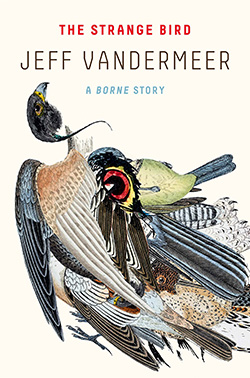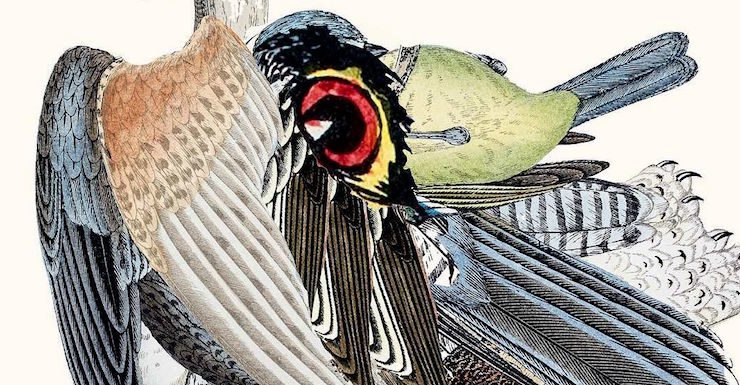In her dreams she’s a woman: a human woman with willpower and wonder and the wealth that comes from having a companion who cares deeply about her—and, crucially, about her future.
But when she wakes, she’s avian in nature, albeit “overlaid with Homo sapiens” and a miscellany of other chromosomal material: an “unstable melange” of life-forms nipped and tucked so very cleverly together by the evil genetic-engineering empire known only as the Company that made Mord (a giant flying bear) and Borne (an amorphous multi-coloured mass) before her. She’s the Strange Bird: the long-suffering subject of the exceptional novella that bears the designation she takes as her name.
Set in the same elegantly wasted world as Jeff VanderMeer’s last, The Strange Bird is ostensibly an embellishment of Borne that crosses paths with any number of that extraordinary narrative’s characters: not to speak of the Company’s previous creatures, Rachel reappears, and with her Wick and the maniacal Magician. But don’t expect any devastating new developments in that regard, for The Strange Bird is neither a prequel nor strictly speaking a sequel. Instead, if I might paraphrase Philip Pullman, it’s an equel: a supplemental story which weaves in and out of and around and about its predecessor’s patchwork plot. Thus, Rachel and the rest say and do the same things they’ve already said and undeniably done. As readers, we do see them differently here, however, thanks to the Strange Bird’s increasingly desperate perspective.
Buy the Book


The Strange Bird: A Borne Story
She emerges from “the fire-washed laboratory” in which she was concocted and then kept in the first sentence of the text, but truly, her troubles have just begun. She finds her wings and wheels routinely to the east, “for there was a compass in her head, an insistent compass, pushing her” in said direction. Towards what, the Strange Bird knows not. “A place she could call home,” she hopes. “A place that was safe. A place where there might be others of her kind” is the last thing on her wish-list, as she is not welcomed by the bona fide birds of this world:
She sang out her song to them, meant as friendly greeting, that recognised them as kin, that said although she did not know them, she loved them. But the little birds […] treated the Strange Bird as foe, with a great raspy chirping, the beat of wings mighty as one, and raked at her with their beaks.
Not knowing what she is, and with even less of an idea why she was made, she sets out on a quest to determine her identity, and perhaps fulfill her furtive purpose in the process. Alas, her journey has hardly started when she spins out and loses consciousness in an awful storm, and when she comes to, she finds herself confined in “a converted prison cell in a building buried in the sand.” Her jailor is an Old Man who calls her Isadora after his lost love and insists he has saved her, but the Strange Bird does not trust him or his weasel words. She trusts Charlie X even less, later, and the Magician least of all, especially when that last places her on an operating table and promises to transform her further.
Surely, the Strange Bird had believed, there could be no place worse than the laboratory or the Old Man’s cell, yet for all the beauty and mystery of the planets revolving there above her, the Strange Bird knew that she was in what Sanji had called “a kind of hell.” [She knew] that the Magician would not kill her. It would be worse than that.
To be sure, The Strange Bird is a tale of transformation, but as one opportunist trades the melancholy medley that is its main character to another, only for another potential owner to express interest, it becomes clear that here, VanderMeer is challenging the concept of choice, and the lack of it allowed to some life. The Strange Bird had no say in her creation; no part to play in setting the direction of her inevitable trajectory; and no option but to oblige the monstrous men and women who treat her like so much meat. Hers is an existence she neither has nor has ever had ownership of, and even at the last, even after fighting tooth and nail for her right to decide, she’s betrayed by the very manner in which she was made.
That the bulk of The Strange Bird is as bleak as a bombed-out building shouldn’t surprise readers who’ve been through Borne and come back to this book for more. Those folks are likely to find it fascinating as a side-story, if not necessarily essential, but as a narrative in its own right, The Strange Bird is as remarkable, and as harrowing—and as oddly hopeful, happily—as its impeccable predecessor.
The Strange Bird is available from Farrar, Straus & Giroux.
Read an excerpt here.
Niall Alexander is an extra-curricular English teacher who reads and writes about all things weird and wonderful for The Speculative Scotsman, Strange Horizons, and Tor.com. He lives with about a bazillion books, his better half and a certain sleekit wee beastie in the central belt of bonnie Scotland.










